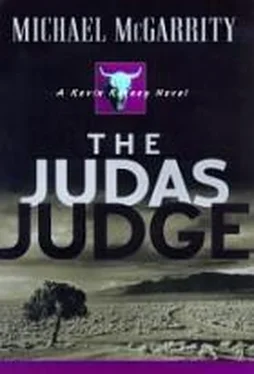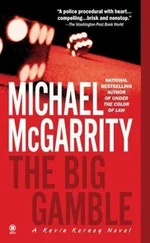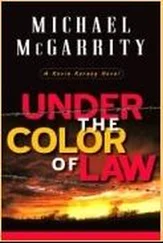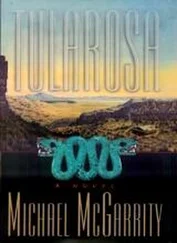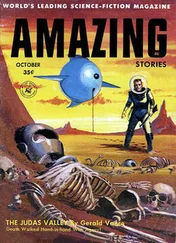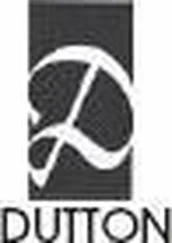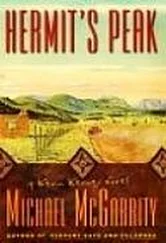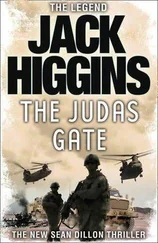Michael McGarrity - The Judas judge
Здесь есть возможность читать онлайн «Michael McGarrity - The Judas judge» весь текст электронной книги совершенно бесплатно (целиком полную версию без сокращений). В некоторых случаях можно слушать аудио, скачать через торрент в формате fb2 и присутствует краткое содержание. Жанр: Триллер, на английском языке. Описание произведения, (предисловие) а так же отзывы посетителей доступны на портале библиотеки ЛибКат.
- Название:The Judas judge
- Автор:
- Жанр:
- Год:неизвестен
- ISBN:нет данных
- Рейтинг книги:5 / 5. Голосов: 1
-
Избранное:Добавить в избранное
- Отзывы:
-
Ваша оценка:
- 100
- 1
- 2
- 3
- 4
- 5
The Judas judge: краткое содержание, описание и аннотация
Предлагаем к чтению аннотацию, описание, краткое содержание или предисловие (зависит от того, что написал сам автор книги «The Judas judge»). Если вы не нашли необходимую информацию о книге — напишите в комментариях, мы постараемся отыскать её.
The Judas judge — читать онлайн бесплатно полную книгу (весь текст) целиком
Ниже представлен текст книги, разбитый по страницам. Система сохранения места последней прочитанной страницы, позволяет с удобством читать онлайн бесплатно книгу «The Judas judge», без необходимости каждый раз заново искать на чём Вы остановились. Поставьте закладку, и сможете в любой момент перейти на страницу, на которой закончили чтение.
Интервал:
Закладка:
"Is there a problem, Officer?" Kerney asked, flipping open his badge case.
"You're trespassing on Apache land," the officer said, dismissing Kerney's shield with a glance. "I need a driver's license from both of you."
Dale fished out his wallet while Kerney did the same. As he watched Kerney hand the officer his license Dale thought there was something familiar about the young man, but he couldn't place it in his mind.
"We didn't see a sign." Kerney said.
The officer pointed to a placard fifty yards away and plucked the driver's license from Dale's hands. "Wait here."
"So much for professional courtesy," Kerney said, as he watched the young officer stand next to the vehicle, open a citation book, and start writing.
"We're getting tickets?"
"Looks that way."
The officer finished up and returned. "You can either pay the fine by mail or appear in tribal court," he said. The name tag over his right shirt pocket read OFFICER CLAYTON ISTEE
"Is the ticket necessary, Officer?" Kerney asked.
"Apache land, Apache laws," Istee said, nodding at the open gate.
"I'll wait here until you leave."
"Cocky young fellow," Kerney said, as Dale fired up the truck and drove through the gate.
"Apaches don't like us much," Dale said. "Actually, he reminds me of you."
"I was never that sassy."
"Oh, really? I meant his looks. He looks like you. Didn't you notice
"You've got to be kidding."
"Same deep-set eyes, same frame, same chin."
The memory of Isabel Istee, his girlfriend during his senior year in college, ran through Kerney's mind. The only girl he'd been serious about up to that time, she'd dumped him without warning or explanation. Whatever her reasons were, it didn't matter anymore. Or did it? He shook his head. It wasn't possible.
"So, don't agree with me," Dale said, misreading Kerney's reaction.
"Let's call it a day, Dale," Kerney said, looking out the window, his thoughts still on Isabel.
"Whatever you say."
Dale dropped Kerney off at the command trailer, where Kerneys unit, sporting four brand-new tires, was parked outside.
On the office desk Lee Sedillo had left a sealed envelope containing his car keys and a note. Nothing had come from the patrol officer's attempt to identify, the person responsible for the vandalism. Since the investigation team was staying at Kerney's motel, Lee had queried each agent about the incident. No one had noticed the damage. Because all personnel had left the motel before Kerney, Lee speculated that the crime occurred after the agents were gone and while Kerney was still in his room. Therefore, it was not a random act.
Lee and the agents were in the field conducting interviews. Kerney spent the remainder of the day poring over the information that had been gathered in the letter-bombing homicide of Marsha Langsford. He finished up by phoning the senior ATF and FBI agents who had supervised the investigation, in the hope that some important shred of evidence had been left out of the case files.
Both agents had concentrated attention on members of the American Indian Movement, a radical Indian rights organization, most famous for the shootout with U.S. Marshals and the FBI at Oglala, South Dakota, in the summer of 1976.
The feds had identified an AIM "cell" that had remained active in the Four Corners region of the state on the Navajo Nation. It had two Mescalero members. On the telephone, the FBI agent kept circling back to the AIM group. But all the evidence showed that the group's concerns at the time were treaty rights, not reservation casino gaming.
When Kerney pointed out that no group had claimed responsibility for the letter-bomb attack, the agent dismissed his observation, arguing that the Apaches were secretive, warlike by nature, and therefore still suspect.
The ATF agent Kerney talked to grudgingly admitted that AIM had never been a suspect in any type of terrorist bombing. But that didn't hold him back from rattling on about the lack of cooperation he'd received from tribal officials during the investigation.
Kerney hung up feeling that both men wanted a quick and easy cowboy and Indian solution to the case and had conveniently blamed the tribe when their investigation stalled.
Before Kerney left to return to his motel room, Lee Sedillo arrived and informed him that the subjects known to have visited all the campgrounds on the days prior to the shootings were in the clear.
"Nothing suspicious at all, Chief," Lee said. "No connections with the victims, and no weak alibis."
"Well, that's one rabbit trail we don't have to keep following," Kerney said, as he walked to the door.
"You read my note about the tires?" Lee asked.
"We'll let the incident slide for now," Kerney said.
"Unless they know the officer, most civilians don't pay any attention to who drives cop cars. Especially unmarked units like yours."
"I've thought about that," Kerney said.
"And you're driving an undercover unit with standard issue motor vehicle license plates, not department plates."
"That, too."
"So?" Lee asked, frustration creeping into his voice.
"So, I agree," Kerney said with a smile. "Whoever doesn't like me may be one of Shockley's buddies."
"Maybe one of our own," Lee said.
"I hope not," Kerney said.
"You still want me to drop it?"
"For now. We haven't got the time."
Back in his room Kerney watched the late news, which headlined the breaking story that Vernon Langsford had been one of the spree victims.
"Team coverage" spun off to review the unsolved letter-bomb murder of Langsford's wife and the search for Langsford's children.
Kerney killed the TV and the bedside light, hoping the media coverage would at least get Linda and Eric Langsford's attention. He needed to talk to them, and soon.
St. Joseph's Mission, the most imposing building in the village of Mescalero, stood on a hillside overlooking the settlement. It was built from hand-hewn stone and logs. Kerney had toured it as a child with his parents, and inside on the wall behind the altar an Apache Jesus looked down on the chapel.
Although the village served as the center of government for the tribe, there were no tidy rows of houses lined up along linear streets. Aside from the few business situated close together along the highway, the schools, government buildings, and tribal enterprises were sprinkled throughout the narrow mountain valley. Most of the homes were located off dirt roads that extended into the forest.
To Kerney's eye, Mescalero seemed deliberately turned away from the non-Indian world that passed through on the highway. As he pulled into the parking lot of the tribal headquarters building, he decided it would be a good idea to remember that observation. Inside, he found his way to Silas Kozine, a senior tribal administrator.
Kozine, a man well past middle age, had gray hair and wide, slightly downturned lips that gave his face a somber cast. He tapped his fingers together while Kerney explained the reason for his visit.
Silas Kozine's expression hardened as Kerney finished, and he said nothing for a long moment.
"I am sorry Judge Langsford has been killed, but I can't see how a murder spree that occurred off tribal land has anything to do with us. We went through this exercise six years ago, when Judge Langsford's wife was murdered in Roswell. No evidence was ever found that connected any tribal member to the crime, in spite of the FBI's attempts to prove otherwise."
"I understand the tribal police conducted an independent investigation of Mrs. Langsford's murder that concentrated on possible tribal suspects," Kerney said. "I'd like to review the file."
"Our chief of police made it clear to the FBI that there were no tribal suspects."
"It might be beneficial to take another look."
Читать дальшеИнтервал:
Закладка:
Похожие книги на «The Judas judge»
Представляем Вашему вниманию похожие книги на «The Judas judge» списком для выбора. Мы отобрали схожую по названию и смыслу литературу в надежде предоставить читателям больше вариантов отыскать новые, интересные, ещё непрочитанные произведения.
Обсуждение, отзывы о книге «The Judas judge» и просто собственные мнения читателей. Оставьте ваши комментарии, напишите, что Вы думаете о произведении, его смысле или главных героях. Укажите что конкретно понравилось, а что нет, и почему Вы так считаете.
